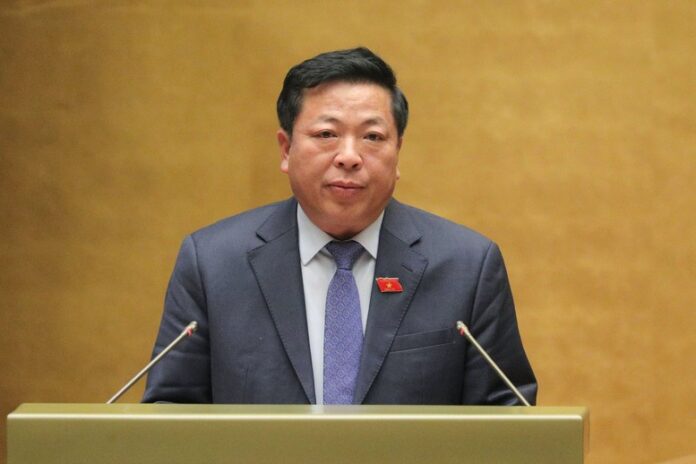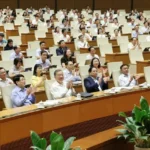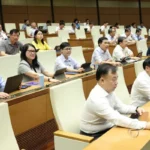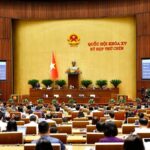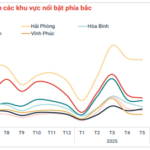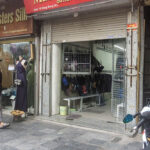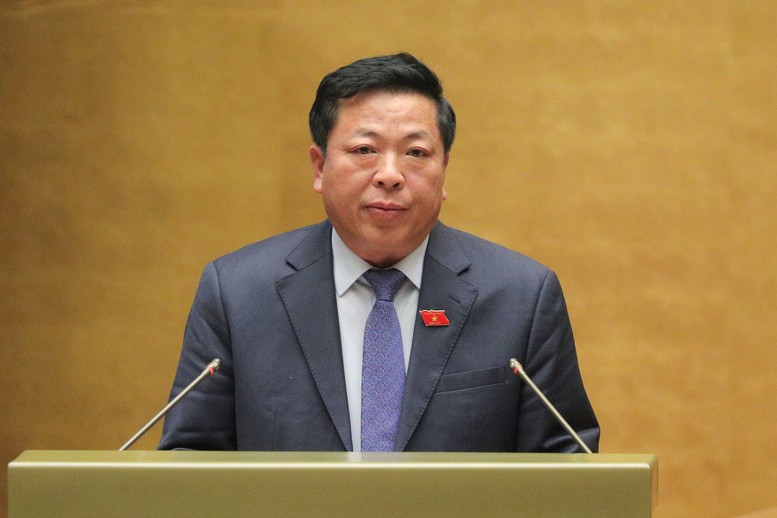
Minister of Construction Tran Hong Minh reports to the National Assembly
The supplementary report on the amended Railway Law presented by Minister of Construction Tran Hong Minh informed that the draft law has been amended to include 23 mechanisms and policies in the draft resolution of the National Assembly on piloting some special mechanisms and policies for investing in the development of the railway system in the chapter on investment in railway construction and Article 5 of the draft law. Of these, four policies were already included in the draft law presented to the National Assembly.
To ensure that the requirements for the progress of investment and construction of railway projects are met, the Government proposes that the new supplementary provisions in the draft law come into force on July 1, 2025, and the remaining provisions of the amended Railway Law come into force on January 1, 2026.
The draft law has been supplemented with special mechanisms and policies for investing in the development of the railway system, creating a breakthrough legal framework for railway development. Specifically, the content of the above-mentioned draft resolution has been incorporated into 20 articles of the draft law, and 33 articles have been amended according to the opinions of the reviewing agency for the draft law presented to the National Assembly.
On June 15, the Government reported on its reception and explanation of the opinions of the Standing Committee of the National Assembly and the reviewing opinions on the draft Railway Law. It has fully received the opinions of the Standing Committee of the National Assembly and explained and amended the draft law accordingly. After the amendments, the draft law consists of four chapters and 60 articles.
Specifically, the scope of the special policies has been reviewed and limited to only apply to important national railway projects and railway projects decided by the National Assembly. It is proposed to supplement the provisions on independent supervision in the implementation of the special mechanisms and the role of state management to ensure tight control over quality, technical standards, and national defense and security in railway projects in accordance with the law on investment.
At the same time, three policies on waste dumps, construction materials, and forest land use conversion were reviewed and removed from the draft law. It is proposed to include them in the general resolution of this session and apply them to the Hanoi-Dong Dang, Hai Phong-Ha Long-Mong Cai railway projects. Two policies on capital arrangement and mobilization were also removed as these policies are related to the requirements and conditions of specific projects and periods and will be considered when deciding on investment policies.
In addition, 19 articles were removed from the previously presented draft law as they contain detailed provisions within the competence of the Government and ministers.
The draft law has also been technically edited regarding the provisions on validity and transitional provisions according to the opinions of the Standing Committee of the National Assembly.
Presenting the verification report on the bill, Mr. Le Quang Huy, Chairman of the Committee for Science, Technology, and Environment, clarified that the Committee agreed to implement the direction of the competent authority to urgently perfect the breakthrough legal framework for investing in the development of the railway system. Therefore, it basically agreed to verify the supplementary Railway Law (amended) and report to the National Assembly for consideration and opinion.
At the same time, it is agreed to pass the bill at this 9th session of the National Assembly according to the procedure at one session. It is requested that the drafting agency supplement the dossier, explain, and clarify the verification opinions.
According to the Government’s report, the draft law has been supplemented and amended to legalize 23 special mechanisms and policies, including 21 mechanisms and policies legalized from the resolutions of the National Assembly, and two new mechanisms and policies, namely Article 24 on investment in railway projects with non-state capital and Article 36 on contracts.
To institutionalize the Party’s guidelines and legalize the special mechanisms and policies that have been stipulated in the resolutions of the National Assembly on investing in the development of some specific railway projects, it is proposed that the drafting agency study and perfect these special mechanisms and policies in the direction of limiting the scope and subjects of application, ensuring the consistency, universality, and sustainability of the legal system, strengthening supervision, publicity, and transparency of information, and having appropriate sanctions. At the same time, the requirements of feasibility, rigor, and efficiency must be ensured.
Regarding the mechanism and policy on the development of urban areas around railways (TOD model) and the exploitation of land funds in the vicinity of stations (Articles 26 and 27), many opinions basically agreed with the mechanism of developing urban areas with public transport as the center (TOD) to exploit the land fund around stations to create resources for railways, in line with the orientation of innovation.
However, it is suggested to clarify and supplement the provisions on the limits of local authority in adjusting planning, the mechanism of independent and transparent supervision in adjusting planning, the criteria for infrastructure capacity and the plan for infrastructure upgrading before approving TOD, the conditions for implementation, the mechanism for dividing sources of revenue, the responsibility for explanation and sanctions, and the review, amendment, and supplementation of related laws.
The Economic Development and Social Progress: A Parliamentary Discussion
Today (June 17th), the National Assembly will devote most of its time in the hall to discussing the implementation of the socio-economic development plan, the state budget, and other significant matters. This discussion session will be broadcast live on television and radio for voters and the public to observe.
“Slash the VAT: A 2% Cut for Goods and Services Across the Board, Minus Property and Securities.”
The government has announced a reduction in the VAT rate from 10% to 8% for a range of goods and services, effective immediately until the end of 2026. This is fantastic news for consumers, as it will result in significant savings across a wide range of purchases. The reduced VAT rate excludes the financial, banking, securities, insurance, and real estate sectors.
“Preserving Unemployment Benefits: Maintaining a Steady 60% Wage Subsidy”
The new TPO – Employment Law (amended) retains the monthly unemployment benefit at 60% of the average monthly salary of the last six months of employment. This law, passed by the legislature, ensures a safety net for those who find themselves without work through no fault of their own.
“Amended Enterprise Law: Tightening the Reins on Private Bond Issuance by Enterprises”
On the morning of June 17, with an overwhelming majority of 95% of the delegates present, the National Assembly passed the Law amending and supplementing a number of articles of the Law on Enterprises. The most notable aspect of this legislation is the provision pertaining to the conditions for private bond issuance by enterprises.
The Magic of Municipal Mergers: Unveiling the 168 New Wards of Ho Chi Minh City
The city of Ho Chi Minh, a bustling metropolis, has undergone a transformation, resulting in a streamlined structure of 168 administrative units at the commune level. This includes 113 wards, 54 communes, and one special administrative region, each playing a vital role in the city’s vibrant tapestry.


























